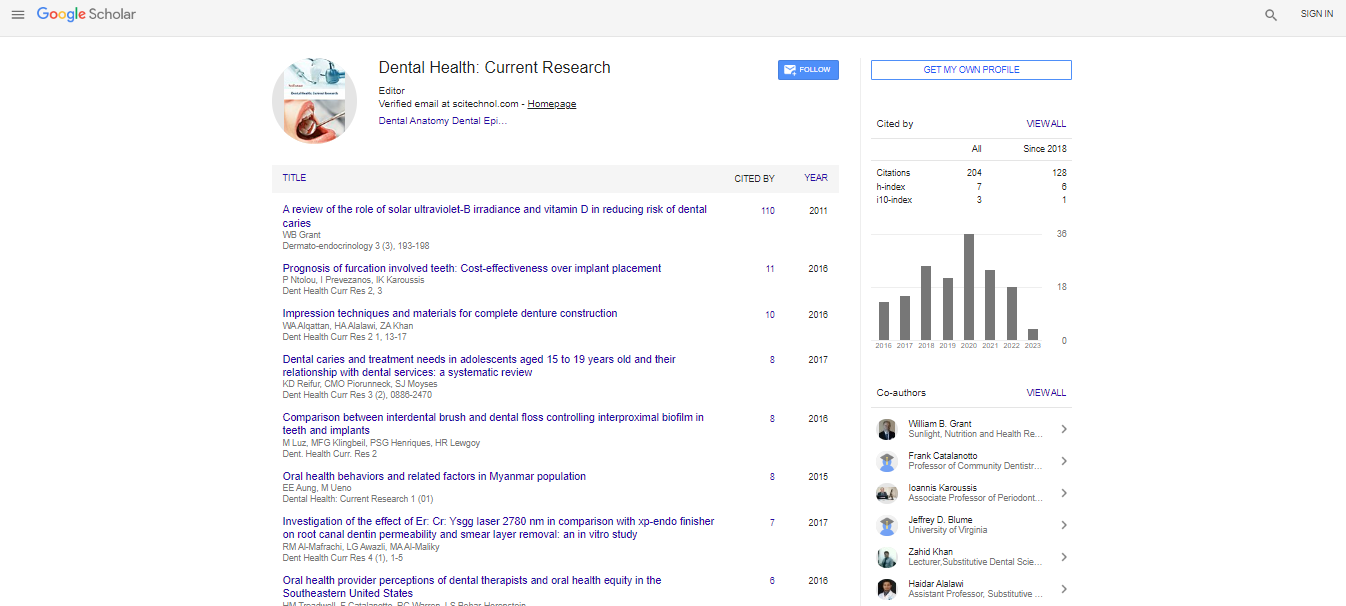Opinion Article, Dent Health Curr Res Vol: 10 Issue: 3
Addressing the Challenges of Edentulism: Oral Health Strategies and Treatments
Sabitawa Aduln*
1Department of Oral Biology, Kuwait University, Kuwait city, Kuwait
*Corresponding Author: Sabitawa Aduln,
Department of Oral Biology, Kuwait
University, Kuwait city, Kuwait
E-mail: sabitawaad@gmail.com
Received date: 28 May, 2024, Manuscript No. DHCR-24-137159;
Editor assigned date: 30 May, 2024, Pre-QC No. DHCR-24-137159 (PQ);
Reviewed date: 14 June, 2024, QC No. DHCR-24-137159;
Revised date: 21 June, 2024, Manuscript No. DHCR-24-137159 (R);
Published date: 28 June, 2024, DOI: DOI: 10.4172/2470-0886.1000217
Citation: Aduln S (2024) Addressing the Challenges of Edentulism: Oral Health Strategies and Treatments. Dent Health Curr Res 10:3.
Description
Edentulism, the condition of being without natural teeth, presents a significant challenge for millions of individuals worldwide. It affects not only a person's ability to eat and speak but also their self-esteem and overall quality of life. Effective management and treatment of edentulism are essential to restoring function and confidence. This article explores the challenges faced by edentulous patients and the oral health strategies and treatments available to address these issues. Without teeth, chewing efficiency is significantly reduced, leading to difficulties in breaking down food. This can cause digestive issues and nutritional deficiencies as patients may avoid hard-to-chew foods such as fruits, vegetables, and proteins.
Teeth play a key role in articulation. Edentulous patients often struggle with pronunciation and clarity of speech, which can affect their communication abilities and social interactions. Teeth support the facial muscles. Loss of teeth can lead to sunken cheeks and a collapsed jawline, impacting facial aesthetics and making a person appear older. The aesthetic changes and functional limitations can lead to a decrease in self-confidence and social withdrawal, contributing to psychological distress. After tooth loss, the jawbone begins to resorb or shrink due to the lack of stimulation from chewing. This can lead to further oral health problems and complicate future dental prosthetic treatments. Dentures, if not well-fitted, can cause sores and irritation of the oral mucosa, leading to discomfort and potential infections. Traditional full dentures are a common solution for edentulous patients. They are custom-made to fit the patient's mouth and restore basic function and aesthetics. However, they may require periodic adjustments to accommodate changes in the jawbone and gums. Dental implants provide a stable and secure foundation for dentures. Implants are titanium posts surgically placed into the jawbone, onto which the dentures are attached. This solution offers improved stability, better chewing efficiency, and helps prevent bone resorption.
Patients should be advised on how to maintain a balanced diet that compensates for the limitations in chewing. Soft, nutrient-dense foods and proper meal planning can help ensure adequate nutrition. In some cases, dietary supplements may be recommended to address specific nutritional deficiencies that arise due to compromised chewing ability. Speech therapy can help edentulous patients adapt to speaking without teeth or with new dentures. Therapists provide exercises and techniques to improve articulation and clarity of speech. Regular visits to the dentist are crucial for maintaining and adjusting dentures to ensure a comfortable fit and to check for any oral health issues. Edentulous patients are still at risk for oral cancers. Regular dental check-ups should include screenings to detect any abnormalities early. For patients with significant bone loss, bone grafting procedures can help rebuild the jawbone structure. This is often necessary before placing dental implants. Timely placement of dental implants can help preserve bone mass and provide the necessary stimulation to prevent resorption.
This technique involves placing four implants in strategic positions in the jaw to support a full arch of teeth. It offers a less invasive and more cost-effective alternative to traditional implant-supported dentures. Advances in technology, such as 3D printing and digital imaging, have revolutionized the fabrication of dental prosthetics. These innovations allow for more precise and customized dentures, improving fit and comfort. Mini implants are a less invasive alternative to traditional implants, often used to stabilize lower dentures. They require less bone density and can be placed in a single visit, making them a convenient option for many patients.
Conclusion
Edentulism poses significant challenges, but with modern dental strategies and treatments, these challenges can be effectively managed. From traditional dentures to advanced implant-supported solutions, there are various options available to restore function and aesthetics for edentulous patients. Combining these treatments with proper nutritional guidance, speech therapy, and regular dental checkups can significantly improve the quality of life for those affected by tooth loss. By staying informed about the latest advancements in dental care, edentulous patients can find the most suitable solutions to regain their oral health and confidence.
 Spanish
Spanish  Chinese
Chinese  Russian
Russian  German
German  French
French  Japanese
Japanese  Portuguese
Portuguese  Hindi
Hindi 